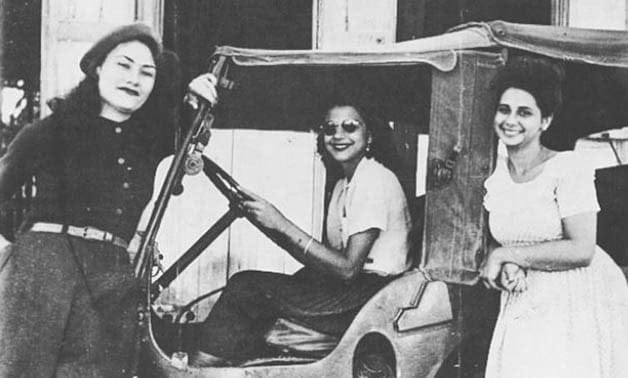The Mirabal sisters were three courageous women who dared to stand up to the brutal dictatorship of Rafael Trujillo in the Dominican Republic. Their unwavering fight for justice, even in the face of danger and oppression, has cemented their place as powerful symbols of resistance and feminist values. This article delves into the lives and legacy of Patria, Minerva, and María Teresa Mirabal, exploring their impactful activism, tragic deaths, and the enduring inspiration they provide for those fighting for freedom and equality worldwide.
Mirabal Sisters Resistance Movement
Imagine living under a regime so oppressive that even whispering dissent could lead to imprisonment or death. This was the reality for Dominicans under Trujillo’s rule in the mid-20th century. Yet, amidst the fear and silence, the Mirabal sisters emerged as beacons of hope, their courage shining brightly against the backdrop of tyranny.
Joining the underground resistance movement, the sisters, often referred to as “The Butterflies,” risked everything to fight for freedom and democracy. They became active members of the 14th of June Movement, a clandestine organization dedicated to overthrowing Trujillo. Working tirelessly in secrecy, they distributed pamphlets criticizing Trujillo’s regime, raising awareness about his atrocities while fueling the flames of opposition.
Trujillo, threatened by their growing influence and the potential for a full-scale uprising, retaliated with characteristic brutality. The sisters were subjected to imprisonment and torture, their spirits tested but never broken. Their unwavering commitment to justice and their refusal to be silenced only seemed to amplify their message, resonating with others who yearned for a better future.
Tragically, on November 25, 1960, Trujillo’s agents ambushed and brutally murdered the Mirabal sisters. While their deaths sent shockwaves throughout the Dominican Republic and the world, it was a turning point in the fight against the dictatorship. The public outrage was palpable, and the simmering resistance against Trujillo finally erupted. Within six months of their assassination, Trujillo’s reign of terror ended, a testament to the power of their sacrifice and the movement they inspired.
What was the Mirabal sisters movement?
The Mirabal sisters’ movement was not simply about opposing one man; it was about dismantling a system that had silenced and oppressed Dominicans for decades. At the heart of their struggle was a deep-seated belief in human dignity and a vision for a future where all Dominicans could live freely.
Central to their movement was the formation of the Movement of the Fourteenth of June, a clandestine group dedicated to bringing down Trujillo’s regime. This group, formed in the wake of a failed attempt to overthrow Trujillo, became a hub for dissent, attracting those who were tired of living in fear.
The sisters were instrumental in disseminating information about Trujillo’s atrocities, distributing leaflets and organizing secret meetings. Their efforts helped to chip away at the regime’s control over information while fostering a spirit of resistance among the population. They understood that knowledge was power and that exposing the truth about Trujillo’s brutality was crucial to mobilizing opposition.
Their activism extended beyond education and propaganda. Recognizing the need for more direct action, the sisters began stockpiling weapons, preparing for the possibility of an armed struggle. This willingness to take up arms demonstrated their unwavering commitment to freedom, even if it meant putting their own lives at risk.
The assassination of the Mirabal sisters in 1960 was a turning point in the fight against Trujillo. While their deaths were a devastating blow, they served to galvanize the resistance movement. Public outrage reached a fever pitch, and within six months, Trujillo’s reign of terror was over.
What challenges did the Mirabal sisters face?
The Mirabal sisters’ fight for freedom came at an immense personal cost. They faced constant surveillance, censorship, and threats to their safety and that of their families. Every day was a balancing act between their commitment to their cause and their desire to protect their loved ones.
One of the most significant challenges they faced was the pervasive atmosphere of fear that permeated Dominican society under Trujillo’s rule. Speaking out against the regime carried the very real risk of imprisonment, torture, or even death, a risk that the sisters were acutely aware of.
Beyond the threat of physical violence, the sisters also had to navigate societal pressures and expectations. In a time when women were often relegated to the domestic sphere, their decision to engage in political activism challenged traditional gender roles and drew criticism from some quarters.
The sisters also endured the agonizing loss of their husbands, who were murdered by Trujillo’s regime. These personal tragedies, while testing their resolve, only seemed to strengthen their determination to fight for a better future.
Despite these challenges, the Mirabal sisters persevered. Their courage, resilience, and unwavering commitment to justice serve as an inspiration to those who continue to fight for freedom and equality today.
What did the Mirabal sisters influence?
The Mirabal sisters’ influence extends far beyond their actions during the Dominican Revolution. Their legacy continues to inspire activism and social movements, serving as a powerful reminder that even in the face of overwhelming odds, courage and resistance can pave the way for profound change.
Their impact can be felt in several key areas:
- Inspiring Resistance Against Tyranny: The Mirabal sisters’ story has become synonymous with the fight against oppression. Their courage in standing up to Trujillo’s brutal regime, even at great personal risk, has resonated with people around the world who are struggling against authoritarian rule. Their legacy serves as a beacon of hope, reminding us that even in the darkest of times, the human spirit can triumph over adversity.
- Empowering Women in the Fight for Equality: The Mirabal sisters’ activism challenged traditional gender roles and paved the way for greater participation of women in social and political movements. Their story highlights the crucial role women play in challenging injustice and advocating for their rights. They serve as powerful role models for women and girls around the world, inspiring them to break down barriers and fight for a more equitable society.
- Promoting Peaceful Resistance and Dialogue: While the Mirabal sisters were prepared to take up arms against Trujillo, their primary focus was on non-violent resistance. They understood the power of education, dialogue, and raising awareness as tools for social change. Their commitment to peaceful methods continues to inspire activists and movements to this day, proving that lasting change can be achieved through non-violent means.
- Highlighting the Importance of International Solidarity: The Mirabal sisters’ struggle against Trujillo’s regime garnered international attention, highlighting the importance of global solidarity in the fight for human rights. Their story emphasizes the need for nations to work together to condemn oppression and support those who are fighting for freedom and democracy around the world.
What do the Mirabal sisters symbolize?
The Mirabal sisters have become potent symbols of resistance, courage, and the fight for social justice. Their legacy extends far beyond the borders of the Dominican Republic, resonating with people around the world who are fighting for a better future.
Here are some of the key ideals that the Mirabal sisters symbolize:
- Courage in the Face of Oppression: The sisters’ unwavering commitment to challenging Trujillo’s regime despite facing constant threats and danger exemplifies extraordinary courage. They didn’t back down, even when confronted with imprisonment, torture, and the loss of loved ones. Their story reminds us that true courage is not the absence of fear, but the willingness to act even when afraid.
- The Power of Collective Action: The Mirabal sisters understood that they couldn’t bring down a dictatorship alone. They recognized the need for collective action and worked tirelessly to build a movement that transcended social and economic barriers. Their story underscores the importance of unity, solidarity, and working together to achieve common goals.
- The Importance of Education and Awareness: The Mirabal sisters recognized that knowledge is power. They understood that exposing the truth about Trujillo’s crimes was essential to mobilizing opposition and inspiring people to action. Their commitment to education and raising awareness serves as a reminder that knowledge and critical thinking are vital tools for social change.
- The Fight for Gender Equality: The Mirabal sisters’ activism challenged traditional gender roles and paved the way for greater participation of women in social and political movements. Their story serves as a powerful reminder that women’s rights are human rights, and that empowering women is essential for building a more just and equitable world.
What is the connection between the Mirabal sisters and the feminist movement?
The Mirabal sisters have become powerful icons of the feminist movement, their lives and legacy intrinsically linked to the fight for women’s rights and equality.
Their connection to the feminist movement is multifaceted:
- Challenging Gender Norms: The Mirabal sisters defied traditional gender roles prevalent in Dominican society during their time. They pursued education, engaged in political activism, and challenged a male-dominated power structure, inspiring women and girls to break free from restrictive societal norms.
- Advocating for Women’s Rights: The sisters’ involvement in the resistance movement wasn’t solely about overthrowing a dictator; it was also about creating a more just and equitable society for all Dominicans, including women. While specific details about their stance on certain women’s issues during that era are still being researched, their actions and commitment to social justice strongly suggest a belief in equal rights and opportunities for women.
- Becoming Symbols of Resistance Against Violence Against Women: The brutal assassination of the Mirabal sisters by Trujillo’s regime tragically underscores the vulnerability of women in oppressive systems. Their deaths sparked outrage and highlighted the need to address and combat violence against women on a global scale.
- Inspiring Future Generations of Feminist Activists: The Mirabal sisters’ courage, determination, and unwavering commitment to justice continue to inspire feminist activists worldwide. Their story serves as a powerful reminder that women have a voice and that they can be powerful agents of change in the fight for equality.
How did the Mirabal sisters help topple a dictator?
The Mirabal sisters played a pivotal role in undermining Trujillo’s grip on power. While their lives were tragically cut short, their activism and the subsequent outrage over their assassinations created a ripple effect that ultimately contributed to his downfall.
Here’s how their actions helped topple a dictator:
- Sparking and Fueling Resistance: The sisters’ involvement in the underground movement, particularly their work with the 14th of June Movement, helped to mobilize opposition against Trujillo’s regime. They galvanized citizens from various walks of life, uniting them under a shared desire for freedom and democracy.
- Exposing Trujillo’s Brutality: The Mirabal sisters recognized the power of information. They disseminated leaflets exposing Trujillo’s human rights abuses and corruption, effectively chipping away at the regime’s carefully crafted facade. Their efforts helped to raise awareness both domestically and internationally, increasing pressure on Trujillo and weakening his grip on power.
- Becoming Martyrs for the Cause: The brutal assassination of the Mirabal sisters backfired spectacularly for Trujillo. Instead of silencing dissent, their deaths ignited a firestorm of anger and resentment. The date of their assassination, November 25th, became a rallying cry for the resistance, further galvanizing opposition and fueling the movement that would ultimately lead to Trujillo’s demise.
- Leaving a Legacy of Resistance: Even in death, the Mirabal sisters continued to inspire. Their sacrifice became a symbol of defiance against tyranny, their story passed down through generations, reminding Dominicans and people around the world that even the most oppressive regimes can be challenged and overthrown.
What is the Mirabal sisters’ legacy?
The Mirabal sisters’ legacy is multifaceted and continues to resonate deeply within the Dominican Republic and globally. They are remembered not only for their tragic deaths but also for their courage, their unwavering commitment to justice, and their enduring belief in the power of the human spirit to overcome even the most oppressive of circumstances.
Here are some key aspects of their enduring legacy:
- Symbols of Courage and Resistance: The Mirabal sisters have become synonymous with the fight against oppression. They are revered as national heroines in the Dominican Republic and are celebrated globally as symbols of resistance against tyranny, inspiring generations to speak out against injustice and fight for human rights.
- Champions of Women’s Rights: The Mirabal sisters challenged traditional gender roles and paved the way for greater participation of women in social and political movements. Their activism and sacrifice continue to inspire women and girls around the world to fight for equality and challenge patriarchal structures.
- Inspiration for Artists and Writers: The Mirabal sisters’ story has inspired countless works of art, literature, music, and film. Their lives and deaths have been immortalized in novels such as “In the Time of the Butterflies” by Julia Alvarez, as well as in films and documentaries. These works serve to keep their memory alive and introduce their story to new generations.
- A Catalyst for Social Change: In the Dominican Republic, the Mirabal sisters’ legacy has been instrumental in promoting social change and advocating for human rights. Their story serves as a constant reminder of the importance of safeguarding democratic values and ensuring that such atrocities never happen again.
The Mirabal sisters’ legacy is a testament to the power of courage, the importance of speaking truth to power, and the enduring impact that even seemingly ordinary individuals can have on the course of history. Their story serves as a beacon of hope, reminding us that even in the face of overwhelming odds, the human spirit can triumph, and that the fight for freedom and justice is a fight worth fighting.
What is the 14th of June Movement In the Time of the Butterflies?
The 14th of June Movement, a clandestine organization central to the Mirabal sisters’ story, played a pivotal role in the fight against Trujillo’s dictatorship. Formed in the wake of a failed attempt to overthrow Trujillo on June 14, 1959, the movement represented a turning point in the Dominican resistance. It signified a shift from sporadic uprisings to a more organized and strategic effort to dismantle the regime.
The Mirabal sisters, deeply affected by the increasing brutality of Trujillo’s regime, joined the movement, dedicating themselves to its clandestine operations. They used the code names “Las Mariposas” (The Butterflies), a testament to their spirit and Minerva’s earlier use of the name “Butterfly” as a symbol of her revolutionary identity.
Within the 14th of June Movement, the sisters were actively involved in various forms of resistance:
- Distributing Anti-Trujillo Propaganda: The sisters risked their lives to distribute pamphlets and leaflets that exposed Trujillo’s atrocities and called for his removal from power. These materials served to counter the regime’s propaganda machine and enlighten the populace about the true nature of Trujillo’s rule.
- Organizing Secret Meetings: The sisters hosted clandestine gatherings in their homes and other discreet locations, providing a safe space for like-minded individuals to discuss strategies, share information, and plan acts of resistance. These meetings were crucial for building solidarity and coordinating efforts against the regime.
- Stockpiling Weapons: Recognizing that peaceful resistance might not be enough, the sisters began secretly gathering weapons and ammunition. They understood the potential need for armed struggle and were prepared to defend themselves and their compatriots if necessary.
The 14th of June Movement, with the Mirabal sisters at the forefront, played a crucial role in galvanizing opposition to Trujillo’s dictatorship. Their bravery and commitment to freedom inspired countless others to join the resistance, ultimately contributing to the downfall of the regime.
How are the Mirabal sisters remembered today?
Today, the Mirabal sisters are remembered as national heroines in the Dominican Republic and are celebrated globally as symbols of courage, resistance, and the fight for social justice. Their legacy continues to inspire activists, artists, and everyday people around the world, reminding us that even in the face of overwhelming odds, individuals can make a difference.
Their memory is kept alive in various ways:
- International Day for the Elimination of Violence Against Women: In 1999, the United Nations General Assembly designated November 25th, the anniversary of the sisters’ assassination, as the International Day for the Elimination of Violence Against Women. This day serves to honor their memory and raise awareness about the global issue of violence against women.
- Museums and Memorials: In their hometown of Salcedo, Dominican Republic, the Mirabal sisters’ childhood home has been transformed into a museum, preserving their memory and showcasing their story. Additionally, statues and memorials dedicated to them can be found throughout the country and in other parts of the world, serving as physical reminders of their sacrifice.
- Literature, Film, and Art: The Mirabal sisters’ story has inspired countless works of literature, film, music, and art. Most notably, Julia Alvarez’s novel “In the Time of the Butterflies” brought their story to international acclaim, further cementing their legacy as symbols of resistance.
- Continued Activism: The Mirabal sisters’ legacy continues to inspire activism and social change, particularly within the women’s rights movement. Organizations and individuals around the world draw inspiration from their story, using their platform to advocate for gender equality, social justice, and an end to violence against women.
The Mirabal sisters’ story is a powerful reminder that even in the darkest of times, individuals can make a difference. Their courage, resilience, and unwavering commitment to justice continue to inspire generations to fight for a more equitable and just world.
Dive into the quote of the Las Mirabales Dominican and witness the resilience and passion of these iconic women who fought against oppression.
Learn about the complex history of the Dominican Republic under Trujillo, uncovering the oppressive regime that shaped the country’s past and its impact on generations to come.












